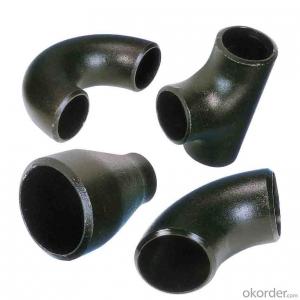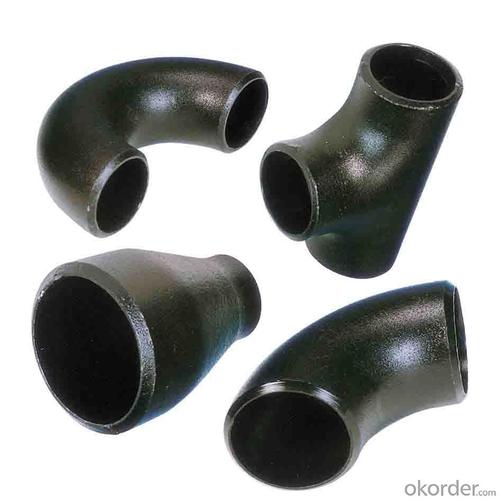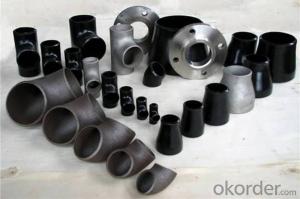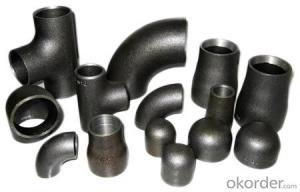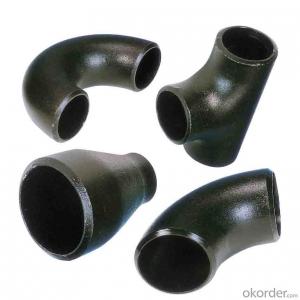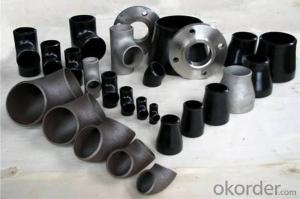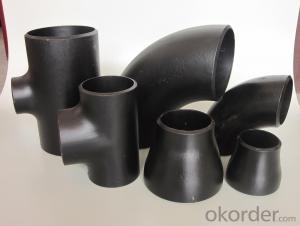64'' ELBOW TEE BEND FLANGE CARBON STEEL FITTINGS
- Loading Port:
- Tianjin
- Payment Terms:
- TT OR LC
- Min Order Qty:
- 5 m.t
- Supply Capability:
- 300 m.t/month
OKorder Service Pledge
OKorder Financial Service
You Might Also Like
Products Detailed Description
Products | pipe fittings elbows, bends,tees, reducers caps |
Size | 1/2" - 48" |
Wall thickness | Sch5-Sch160 XXS |
Standard | ANSI, ASME API5L, OCT, DIN and JIS, etc. |
we can also produce according to drawing and standards provided by customers. | |
Material | Carbon steel, alloy steel and stainless steel. |
We can produce according to materials appointed by consumers. | |
Packaging | Plywood Cases,plywood pallet, plastic bag or as customers requirement |
Surface Treatment | Shot blasted, rust-proof black oil |
Delivery Time | 10-60 days |
Quality | First grade |
Others | 1.Special design available according to your drawing. |
2.anti-corrosion and high-temperature resistant with black painting | |
3. All the production process are made under the ISO9001:2000 strictly. | |
4. A conformity rate of ex-factory inspection of products. |
Specifications
Ansi B16.9 WPB carbon steel pipe fitting elbow tee reducer
Size:Seamless 1/2"-24" Welded 1/2"-48"
ANSI B16.9 WPB carbon steel pipe fitting elbow tee reducer
1.Size: Seamless 1/2"-24" Welded 1/2"-48"
2. WT: SGP, STD, SCH40, SCH80, SCH100,SCH120,SCH160,XS,XXS
3. Material:
stainless steel Grade: 201,304,304L,316,316L,317,317L,904L,and etc
carbon steel Grade: WPB,GRB, Q235,16MN
Alloy steel: st35.8,st52,wp11,wp22,wp12 wp l6
4. Standard: ASTM/AISI/DIN/JIS
5. Type: Concentric and eccentric
6. Surface treatment: Transparent oil, rust-proof black oil
7. Applications range: Applications range: for use in the petroleum, smelting, foodstuff, power, papermaking, chemical, medical equipment,aviation, boiler heat exchanger, and other fields
8. Packing: wooden case or as per customers' requirement
- Q: How are steel pipes insulated for thermal applications?
- Steel pipes are commonly insulated for thermal applications using various materials such as fiberglass, mineral wool, or foam insulation. These insulating materials are typically wrapped around the steel pipes to create a protective barrier that reduces heat transfer. Additionally, a vapor barrier may be installed to prevent moisture condensation. This insulation helps to maintain the desired temperature of the fluid or gas being transported through the pipes and prevents energy loss.
- Q: Are steel pipes resistant to electromagnetic interference?
- Yes, steel pipes are generally resistant to electromagnetic interference due to their conductive properties. The metallic nature of steel allows it to effectively shield against electromagnetic waves, making it a suitable choice for applications where electromagnetic interference needs to be minimized or avoided.
- Q: How are steel pipes used in the manufacturing of renewable energy systems?
- Steel pipes are widely used in the manufacturing of renewable energy systems due to their durability, strength, and versatility. They are primarily used in the construction of wind turbines, solar panel frames, and the transmission of geothermal energy. Steel pipes provide the necessary structural support and stability required for these systems, ensuring their long-term functionality and reliability. Additionally, steel pipes are often used for transporting and distributing renewable energy sources, such as natural gas and hydrogen, further contributing to the overall efficiency and sustainability of these systems.
- Q: Are steel pipes more expensive than other types of pipes?
- Steel pipes can be more expensive than other types of pipes, but this can vary depending on various factors such as the size, grade, and specific application requirements.
- Q: What are the common uses of steel pipes in construction?
- Steel pipes are commonly used in construction for various purposes due to their durability and strength. One of the most common uses of steel pipes in construction is for plumbing systems. Steel pipes are often used to carry water, gas, and other fluids throughout a building. They are preferred over other materials due to their resistance to corrosion and ability to withstand high pressure. Another common use of steel pipes in construction is for structural support. Steel pipes are often used as columns or beams to provide structural integrity to buildings. They can support heavy loads and provide stability to structures, making them a popular choice in the construction industry. Steel pipes are also commonly used in the construction of bridges and highways. They are used for creating strong and durable bridge supports, guardrails, and signposts. Steel pipes are able to withstand extreme weather conditions and heavy traffic, making them a reliable choice for infrastructure projects. Furthermore, steel pipes are used for underground utilities such as sewer and drainage systems. They provide a strong and long-lasting solution for transporting wastewater and preventing leaks. Steel pipes are also used in the construction of underground tunnels and pipelines. In addition to these common uses, steel pipes are also utilized in construction for fencing, scaffolding, and handrails. They are chosen for their strength, versatility, and ability to withstand harsh environmental conditions. Overall, steel pipes are an essential component in construction due to their numerous advantages. Their durability, strength, and resistance to corrosion make them a reliable choice for various applications in the construction industry.
- Q: What are the safety considerations while handling steel pipes?
- When handling steel pipes, some key safety considerations include wearing appropriate personal protective equipment (PPE) such as gloves, safety glasses, and steel-toe boots to protect against potential injuries. It is important to be cautious of the weight and size of the pipes, using proper lifting techniques and equipment to prevent strains or accidents. Additionally, workers should be mindful of the sharp edges and potential for cuts or punctures, ensuring they have a clear and organized workspace to minimize the risk of tripping or falling. Regular inspections of the pipes for any damages or defects are also crucial to prevent accidents and maintain a safe working environment.
- Q: How are steel pipes classified based on their diameter?
- Steel pipes can be classified based on their diameter into various categories. The most common classification system for steel pipes is based on the nominal pipe size (NPS). NPS is a North American set of standard sizes that are used to designate the diameter of a pipe. It is expressed in inches and represents the approximate inside diameter (ID) of the pipe. Steel pipes are typically classified into three main categories based on their diameter: small bore, medium bore, and large bore. Small bore pipes typically have NPS of 2 inches and below, medium bore pipes have NPS between 2 and 24 inches, and large bore pipes have NPS greater than 24 inches. In addition to the NPS classification, steel pipes can also be classified based on their actual outside diameter (OD). This classification is used to determine the compatibility of pipes with fittings and other components. The OD classification is usually expressed in inches or millimeters. Overall, the classification of steel pipes based on their diameter provides a standardized system for easy identification and selection of pipes for various applications. It helps in ensuring compatibility, efficient installation, and effective functioning of piping systems in different industries such as construction, oil and gas, plumbing, and more.
- Q: What is lined pipe?
- Is the coating of the inside of the pipe, such as pipe conveying sulfuric acid will corrode, corrosion, but soft plastic pipe, buried in the ground to wall thicker, then you can use the liner and characteristics of hard for using steel pipe laying, sheathed in the steel pipe into the thin plastic tube, it can transport the sulfuric acid,
- Q: Can steel pipes be used for underground utility lines?
- Yes, steel pipes can be used for underground utility lines. Steel pipes are known for their durability and strength, making them suitable for underground applications. They can withstand heavy loads, pressure, and corrosion, which are essential factors for utility lines that are buried underground. Additionally, steel pipes can be welded or threaded together, allowing for easy installation and maintenance.
- Q: How are steel pipes used in the manufacturing of power distribution systems?
- Steel pipes are commonly used in the manufacturing of power distribution systems as they provide a reliable and durable solution for transporting and protecting electrical cables. They are used to create conduits that house the cables, ensuring safe and efficient transmission of electricity throughout the system. Steel pipes also offer resistance to corrosion, fire, and extreme weather conditions, making them a suitable choice for power distribution systems.
Send your message to us
64'' ELBOW TEE BEND FLANGE CARBON STEEL FITTINGS
- Loading Port:
- Tianjin
- Payment Terms:
- TT OR LC
- Min Order Qty:
- 5 m.t
- Supply Capability:
- 300 m.t/month
OKorder Service Pledge
OKorder Financial Service
Similar products
Hot products
Hot Searches
Related keywords
